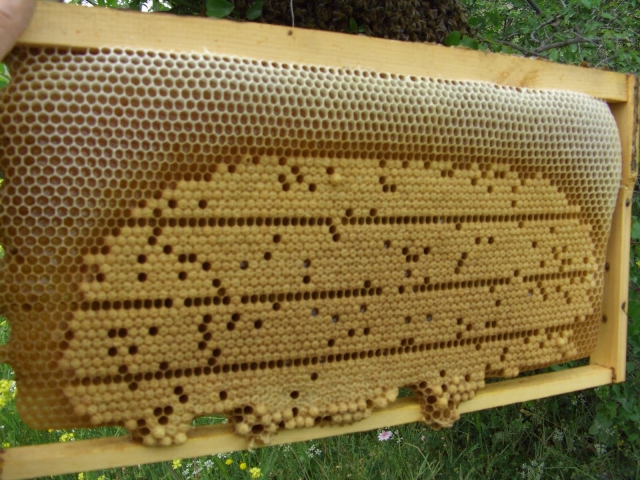Anastasia Balezdrova
The Greek beekeepers consider as a victory the decision of the European Commission to ban for two years the sale of three pesticides that are deadly to bees. The use of Clothianidin, Thiamethoxam and Imidaclopid will be banned in the European Union from December this year onwards.
 The chemicals belong to the group of neonicotinoids and the dramatic reduction in the number of bees in recent years has been due to them. GRReporter contacted professor of bee keeping at Aristotle University of Thessaloniki, Andreas Thrasivoulou. He explains that neonicotinoids remain in soil for a long time - over thousands of days. "From the root, they go into the stem, then into the leaves and in the end, into the juice of the plant and into the pollen. Bees collect pollen, but the concentration of the pesticide is not deadly to them. Then, they carry it in their nests, where they store it. Pesticide residues remain there for a long period of time. Bees produce royal jelly, with which they feed the larvae. They take this poison, which practically destroys whole generations.
The chemicals belong to the group of neonicotinoids and the dramatic reduction in the number of bees in recent years has been due to them. GRReporter contacted professor of bee keeping at Aristotle University of Thessaloniki, Andreas Thrasivoulou. He explains that neonicotinoids remain in soil for a long time - over thousands of days. "From the root, they go into the stem, then into the leaves and in the end, into the juice of the plant and into the pollen. Bees collect pollen, but the concentration of the pesticide is not deadly to them. Then, they carry it in their nests, where they store it. Pesticide residues remain there for a long period of time. Bees produce royal jelly, with which they feed the larvae. They take this poison, which practically destroys whole generations.
29% of beekeepers in Greece are professionals. Neonicotinoids also affect the communication of bees with plants. Each plant has its smell and the bees detect it by the scent of its nectar. The pesticides reduce this scent and as a result, the bees do not go to these plants. When the bees return to the nest without pollen, the queen bee does not give birth. The population is declining and we suffer losses."
In Greece, neonicotinoids have caused huge losses, especially to the producers in the region of Attica. The pesticides were used to fight the red beetle, which is subversive to palm trees, and it cost the local beekeepers losses of around 50% of their swarms. However, these dangerous pesticides affect not only the bees but also human health, because they pollinate one third of the crops that reach our tables.

Greece ranks second in Europe by the number of apiaries – 1,500,000.
The decision of the European Commission is based on a study carried out by the European Food Safety Authority (EFSA). According to the study the toxicity of the three pesticides is 7,000 times higher than that of the pesticide DDT, which was banned in the 1970s.
Representatives of 15 member states, including Bulgaria, voted "for" the ban, eight - "against", and four abstained. One of them was Greece. To explain this position, sources from the Ministry of Agricultural Development indicated that the EFSA report did not contain sufficient data and that a mass extinction of bees due to the use of the specific pesticides had not been registered in Greece.
According to Professor Thrasivoulou, the Ministry was informed about the damage from the use of the harmful pesticides by both professional and scientific organizations, and ordinary beekeepers and political parties. "The Ministry was fully aware of the problem. However, instead of listening to the manufacturers and us, they preferred to listen to the companies that produce the pesticides. During the first vote in March, they voted "for" keeping the pesticides in Europe. They abstained during yesterday's vote. They did not have the courage to say "no" to the neonicotinoids. Now, we, the Greek researchers, will have to explain to our colleagues from other countries why we have failed to convince the Greek authorities of the risks carried by these pesticides."
Apiaries in Europe are densest - 11.9 apiary per square kilometre.
However, the Greek beekeepers have relaxed due to the decision adopted yesterday. "The decision adopted yesterday was something we all wanted. In relation to the second vote, we had sent a letter to the Ministry, urging our representative to support the ban on the use of the dangerous pesticides," Joseph Manikis, president of the Greek association of honey producers, told GRReporter.
There was not a majority during the first vote. Yesterday, the representatives of the member states actually voted for the appeal, which the European Commission had submitted to the relevant committee in Brussels with a request to review its proposal to ban the pesticides that are deadly to bees. During yesterday's vote, a large number of the countries with a higher number of votes changed their original position. Germany, which has 29 votes along with Italy and had abstained from the vote in March, joined the camp of the ban yesterday. And this despite the enormous pressure from the companies producing the pesticides, namely the German Bayer and the Swiss Syngenta.
Greek consumers consume the largest amount of honey per person in Europe – 1.620 kg per year.
Despite its support for the ban a month ago, Italy opposed the ban this time because it had not had the chance to treat the crops before flowering.
The ban will be in force for two years and will be applied to the following crops - corn, cotton, sunflower and rapeseed, which feed the bee populations.
"We must not forget that the most important thing bees give us is neither honey, nor pollen, nor royal jelly, but pollination. Without pollination, neither plants, nor animals, nor people will exist," said the professor.